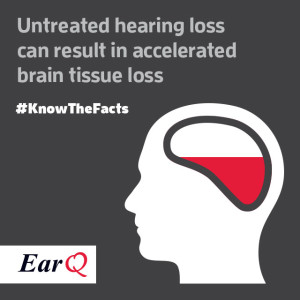 Guest article by EarQ
Guest article by EarQ
Today, 48 million Americans report some degree of hearing loss. Meanwhile, someone in the United States develops Alzheimer’s disease, the most common type of dementia, every 67 seconds. Now, new research is beginning to show that the two conditions have more in common than you may think.
When it comes to things like language processing, if you don’t use it, you lose it. This means that people with untreated hearing loss can slowly lose some of their ability to understand and process speech. This could be an explanation for why hearing loss has been strongly associated with dementia [4/24/2025 TCV Update: Original URL directs to a business marketing website] in older Americans. What’s more, those with untreated hearing loss have been shown to lose brain tissue faster than people who don’t have hearing loss.
However, there is good news. Studies have shown that using hearing aids to address hearing loss can help to curb these effects and slow the onslaught of cognitive decline and dementia.
Many people are hesitant to admit that they have hearing loss. And once they admit it, they often don’t want to use hearing aids because of negative social stigmas. This can pose a challenge to caregivers, as it can be difficult to persuade their loved one to take corrective action.
There are several signs you can lookout for in order to tell if your loved one might have hearing loss:
- Turns the television or phone volume up louder than you typically do.
- Often asks people to repeat themselves.
- Has trouble understanding young children or people with higher-pitched voices.
- Sometimes seems more withdrawn from social settings than before.
If you feel that your loved one might have hearing loss, there are a handful of techniques you can use [4/29/2025 TCV Update: URL no longer available] that might help you to guide them toward the decision to get their hearing evaluated:
- Explain that annual hearing tests are recommended for everyone, similar to the way you get annual physician’s checkups or semi-annual dental cleanings.
- Tell them about the links between untreated hearing loss and other associated conditions.
- Be prepared for common objections such as “I’m too young to lose my hearing,” “Hearing aids are hard to take care of,” and “It’s embarrassing to wear hearing aids.” Do your research on these myths and know how you will counteract them.
- Show them a handful statistics in order to let them know they’re not alone, such as the fact that 20% of adults in the U.S. are affected by hearing loss in some way.
- Go with them to the hearing evaluation and have your hearing tested as well!
Both hearing loss and dementia come with challenges, but as a caregiver, your love, support, and assistance helps to make them a little easier. By using these tips to help your loved one address possible hearing loss, the two of you will work together to make every day better than the last.
 EarQ [4/29/2025 TCV Update: EarQ is now CQ, a Marketing site.] is a nationwide network of 1,400 independent hearing healthcare provider locations creating national public awareness to advocate for greater access to quality hearing healthcare services and products.
EarQ [4/29/2025 TCV Update: EarQ is now CQ, a Marketing site.] is a nationwide network of 1,400 independent hearing healthcare provider locations creating national public awareness to advocate for greater access to quality hearing healthcare services and products.
TCV Ed: Quick Statistics from the National Institute on Deafness and Other Communication Disorders (NIDCD).









I am so glad to have found this website. I watched my father’s hearing deteriorate, his social awareness decline, and he withdrew from interactions with others before I was able to convince his medical team and family members that he was in dementia. By the time I was able to get their support and assistance to get him into assisted living, he was in rapid decline and was gone in a week as his brain stopped telling his body to function. I (and several family members) struggle with hearing loss and have hearing aids. They do make a difference! As Dad declined he was not updating the settings regularly and I think that this caused much of the decline. (Chicken and egg, probably) Why does Medicare not cover hearing aids for those who need them? I have coverage, as I am still working, but my family members do not.
Terrissa
Terrissa, you raise good points. I recall reading an excerpt this week, about Medicare and hearing aid coverage. I eagerly await to learn more.
I tried to sign up for your newsletter but it would not take my information.
Help.
Pamela, I am sorry for the glitch and the inconvenience. Sometimes things don’t work smoothyly, although they should.
Try clicking on this: Click to SIGN-UP for The Caregiver’s Voice monthly Newsletter – it’s FREE!
And then be sure to look for the confirmation email that you must also click on to confirm you do want to subscribe.
Brenda
Low fidelity connections found in some VOIP services and rural mobile phone connections, result in dropouts, voices with echos, and overall poor message clarity. These make it difficult for people with hearing loss to have meaningful conversations.
I am deaf in one ear and in group situations miss much of what is said along my left side. A week later, when people ask me, “Remember? You were sitting right there!” Well, no. I do not remember what I did not hear after growing tired of asking, “What did you say?”
Unfortunately, due to nerve deafness (requiring implant surgery), I cannot benefit from even these newer high tech hearing aids that help people hear in diverse settings. Although, one set I tried, I could sense vibrations enough to turn to see that a person was talking to me.